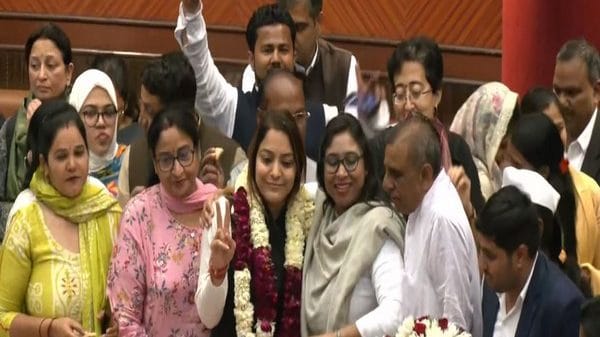After three unsuccessful municipal house meetings, fist-fights, slaps, hurling things at each other, high-decibel sloganeering, and ugly accusations, when the voting to elect Delhi’s mayor concluded Wednesday, Aam Aadmi Party Shelly Oberoi turned to her party members and flashed a victory sign. Others started chanting ‘Zindabad’ slogans. The Delhi University visiting assistant professor was finally on the coveted post, two months after winning her debut election.
At a press conference later, Oberoi declared that “Goondagardi (hooliganism) has been defeated”. “It is not the victory of AAP. It is a victory of democracy. It is a victory of the people of Delhi,” she said. With this, AAP finally got its ‘double engine government’ in Delhi. But it’s still a pyrrhic victory considering AAP struggled to get its mayor elected for two months despite being in majority in the legislative assembly as well as in the municipal house. And that is why Shelly Oberoi is ThePrint’s Newsmaker of the Week.
The importance of mayor post
For the AAP, which often finds itself in conflict with the Centre over administrative powers, winning the MCD election and the mayor post was a way to solidify its hold over Delhi’s administration. The AAP kickstarted its campaign by visiting the infamous Ghazipur landfills, which became a major poll issue during the MCD election. Oberoi has her priorities set. After being elected, she said the AAP-led municipal corporation will carry out an inspection of landfill sites in the next three days and also work to deliver the party’s “10 guarantees” promised to people before the MCD polls.
In a protest rally last month, AAP MLA and spokesperson Saurabh Bhardwaj was speaking alongside Shelly Oberoi. “BJP has PhD in dishonesty, and here is our candidate, she has a Phd in commerce, yet those who have a doctorate in dishonesty are ready to take oath,” he said. Oberoi’s candidature reinforced how AAP had projected itself in its early days. During its genesis, the Arvind Kejriwal-led AAP promised to change the composition of politics. Instead of infamous hardened criminals or people with money and muscle power, it promised to put educated faces at the forefront. Oberoi is one such face.
A former assistant professor at Delhi University, Oberoi is more known for her academic laurels. A DU graduate, she later pursued her Doctorate in Philosophy from the School of Management Studies (SOMS), Indira Gandhi National Open University (IGNOU).
Oberoi joined the AAP in 2013 as a volunteer and rose through the ranks to become the state vice-president of the party’s women’s wing in 2020. A first generation politician, this was her debut election.
She won the MCD election in December from East Patel Nagar ward, considered the home ground of former Delhi BJP chief Adesh Gupta.
Also read: Where is India’s politics headed? Just wait for the result of 2022 Delhi civic body polls
The fights and blame game
Fist-fights, allegations of being drunk in the House, attacking with sharp objects and blame-game — this is how the first three meetings of the MCD House situated in a sophisticated Civic Centre can be described.
While the odds were in favour of the AAP due to its sheer majority, the contention over voting rights of aldermen (members nominated by the Lieutenant Governor) delayed the process.
The MCD House was adjourned thrice — on 6 January, 24 January, and 6 February — to elect the mayor, deputy mayor and the six standing committee members. The results for the 250-ward municipal election were declared on 7 December. The AAP won 134 against BJP’s 104. Both parties’ tally went up by one each, after a Congress councillor joined the AAP and an Independent councillor joined the BJP.
The House met for the first time on 6 January but got adjourned following violent clashes between the AAP and BJP leaders. The councillors could take oath during the second meeting on 24 January, but mayor and deputy mayor weren’t elected.
The AAP had been claiming the aldermen have no right to vote in the election of a mayor or deputy mayor, while the presiding officer Satya Sharma declared in the third meeting of the House that the 10 aldermen could vote, which was later overruled by the Supreme Court following a petition moved by Oberoi.
More parliamentary limits were crossed during the fourth meeting — the first half of which was largely peaceful but turned into a chaotic situation as sloganeering and fights went on the whole night over the election of standing committee members.
Before Oberoi delves into administrative work, her primary challenge awaits in the form of helping elect the six standing committee members. Since non-administrative decisions cannot be taken in the MCD without the approval of the standing committee, the BJP stands to gain if it can get more of its members elected to this committee. The MCD House is choosing the standing committee members as we write, and the AAP versus BJP fight has already begun. While Oberoi declared one vote as invalid, both the parties are celebrating and claiming victory.
The MCD will have to elect five mayors for five years, starting with a woman mayor. In a House where even electing a mayor took about two months, more challenges are in order.
Oberoi’s major challenge comes in the form of maintaining order in the House where the BJP also has a significant presence. After ruling the municipal council for 15 years, the BJP is in no mood to let the reigns pass on so easily.
It will be interesting to see how Oberoi the debutant fares in this key position, which is expected to help AAP win more control over New Delhi’s administration.
Views are personal.
(Edited by Prashant)






